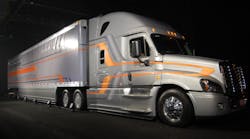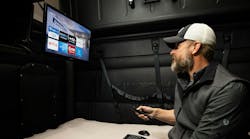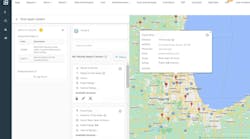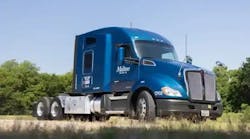NASHVILLE, TN. The overarching message of four CEOs of major trucking OEMs and suppliers is that the growing challenges the industry presents to their firms will be met with ever more innovation delivered ever more swiftly.
The chief executives outlined their visions during a panel presented here yesterday at the Heavy Duty Manufacturers Assn.’s Heavy Duty Dialogue 2013 seminar.
Martin Daum, president & CEO of Daimler Trucks North America, kicked things off with his take on where Class 8 truck sales are headed. Playfully calling trucking a “boring business” because of the uneven yet predictable cycles of truck-sales levels, Daum said the “future expected average” for NAFTA Class 6-8 sales for the period from 2010-2019 will be 375,000 units.
Putting that figure in perspective, he pointed out it is 3.5% higher than the 2000-2009 average of 362,500 units. And that performance was 4.7% better than the 346,000 average for 1990-1999.
Diving deeper, Daum said that how 2013 will end up currently appears to be “an unclear path.” He explained that NAFTA Class 6-8 retail sales were 344,000 units and that 2013 will finish “plus or minus 10%” of that figure-- either with 378,400 or 309,660.
Zeroing in on the U.S. market alone, he pointed out that 2012 sales were 194,700 units and the corresponding plus or minus 10% figures will add up to either 214,200 or 175,200.
While the market may be unsettled, Daum contended that innovation by manufacturers to meet trucking’s myriad challenges is unbounded. “Today’s offerings are so much better than that of even several years ago,” he observed.
Daum reviewed various current/future challenges and said advances in several technology areas will ensure they are met:
- Vehicle technology will see increased focus on trailer aerodynamics and alternative materials for better weight management
- Integrated powertrains will address trends toward lower engine RPM, energy management, reducing parasitic losses and alternative power management
- Vehicle intelligence will be applied to further powertrain integration, bring hybrid technology enhancements and aid interactive driver coaching
- Virtual technologies will be deployed to increase uptime and productivity
- Active-safety technology will focus on active brake assist, electronic stability control, vision systems and radar systems
- “Human-machine interface” technology will improve driver living space and entertainment options as well as reduce fatigue factors
Daum also declared emphatically that “the 10-mpg tractor is no longer a fairy tale.” He pointed out that Daimler’s Freightliner Cascadia Evolution tractor “with enhancements” has been shown to deliver 9.31 mpg in over-the-road operation and 10.67 mpg on a closed test track. “This is innovation,” he added, “and it is moving fast.”
“Global [product] platforms are a foundation for growth,” stated Chip McClure, chairman, CEO & president of Meritor. He said part of the challenge in delivering trucking products to global markets is that technology development and new products are interconnected.
That is to say, he explained, “product development is based on one of two drivers.” Either “product needs drive the resolution of potential technology gaps” or “new technologies may drive [the development] of new products.”
McClure also pointed out that legislation also drives technological developments and product innovations. For example, he said that the shortening of stopping-distance requirements in this market led to development of a new cam drum brake while greater emissions controls in Europe led to increased axle efficiency and faster drive-axle ratios.
“Global technology is a balancing act,” McClure stated. “Success goes to those that have the right product and process innovation.” He said for Meritor, having that success means the company will:
- Maintain and build a stronger aftermarket business
- Stay the course on its “cradle-to-grave approach”
- Keep providing “smart” support services
- Provide customers with “lowest operating cost and superior value”
Dick Giromini, president & CEO of Wabash National, advised that there is growing recognition that “trailer makers can help improve fuel economy, too.” He specifically cited their ability to optimize total vehicle weight—including the weight of aerodynamic devices added to help save fuel—and said reducing trailer weight also boots payload and helps offset tractor weight.
“Helping make this happen,” he advised, “will be greater use of lightweight but high-strength materials” in trailer construction. He also said more work will be done to minimize the tractor-trailer “gap” to improve fuel efficiency and that more buyers will move to full trailer side skirts to enhance aerodynamics.
Giromini said another trailer trend to watch will be variable ride-height suspensions and the development of nitrogen-based cooling systems for reefers that are “silent-running, emit no greenhouse gases and provide fuel savings as well.”
Gary Gerstenslager, president & CEO of Hendrickson, discussed the challenges of global engineering facing suppliers today. He pointed out that there are certainly no one-size-fits-all solutions around the trucking globe. For example, he said that when it comes to equipment durability and duty cycles, “every region is different and the equipment for it is different—and the only thing similar even in developing countries is the overloading.”
According to Gerstenslager, team coordination of product development and application engineering is critical for success in global markets. He noted that even time zones add to the complexity of product engineering for different markets and that a key to success in this arena is to put in place standardized engineering systems.



